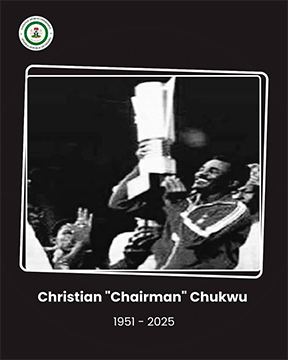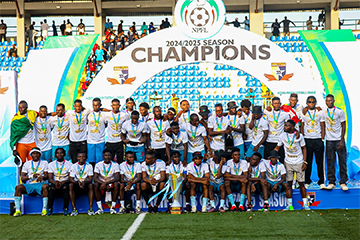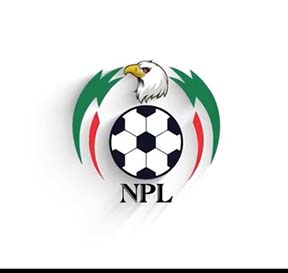Nigerian Football
National Stadium Lagos: Ambode Promises Legacy For Next Generation
Governor Akinwunmi Ambode of Lagos State has promised to bequeath a legacy for the next generation.
He made the promise when he visited the National Stadium Surulere in company of the Minister of Youth and Sports Barrister Solomon Dalung on Wednesday.
According to a press statement issued by the special adviser to the sports minister, Nneka Ikem Anibeze, the governor said that his government will create an all inclusive infrastructure that will not only provide facilities for sports men and women to train but will also allow families to bond.
“We promised during our campaign to use tourism, entertainment, arts and sports to drive youth employment and excellence. This is just one chapter in that road map to growing the GDP of Lagos. We cannot fold our arms and leave this monument to waste away. The last match that was played here was almost fifteen years ago. The truth is that the inner key to youth empowerment and youth employment is in re-establishing this edifice to its real world class standard, and then you earn layers of employment for our younger ones and even create family bonding”
Earlier, the minister thanked Governor Ambode and the people of Lagos State for stepping in to restore national pride to the stadium.
Barrister Dalung noted that the country’s sports history remains inconclusive if nothing is done to address the level of deterioration at the National Stadium.
“This edifice is a monument of national pride. Our visit is very important because it has provided us with the information on how we got to where we are today and what steps can be taken to forestall this in future. We have gone round and seen that this edifice is in a sorry state. The level of dilapidation is embarrassing. It can never be equated with our civilization as a people.”
Barrister Dalung urged the governor to establish a state infrastructural development agency when negotiations on the stadium are concluded, to help in the sustenance and development of the structure. He also promised continued partnership with Lagos state in other sports and youth empowerment related projects.
The Governor and the Minister visited the two training pitches, the indoor halls, the main bowl, switch room, the dilapidated boardroom as well as the players’ changing rooms.
Talks on a possible handover of the National Stadium to Lagos state will continue after a technical team carries out an evaluation of the level of decadence at the stadium.
Nigerian Football
Burial date for Christian Chukwu announced

Nigeria’s former football captain and coach, Christian Chukwu, will be buried on August 22.
According to Segun Odegbami, a teammate in the national team in the 1980s, the deceased’s family announced the date.
He also revealed in his LinkedIn post that arrangements for a national befitting burial have already begun.
Plans are underway for an event to take place in Lagos, where he played most of his national team football, to enable his fans and friends who may not be able to travel to Enugu for the funeral to celebrate the legendary Nigerian football hero.
Join the Sports Village Square channel on WhatsApp: https://whatsapp.com/channel/0029Vaz7mEIGk1FxU8YIXb0H
Nigerian Football
Remo Stars’ lifting of the NPFL trophy marks the 35th anniversary of professional football in Nigeria

BY KUNLE SOLAJA.
Remo Stars’ coronation as Nigeria’s new football kings perhaps marks the 35th anniversary of the introduction of professional football in Nigeria.
It was on this day, 12 May 1990, at the now Mobolaji Johnson Arena Stadium that the professional league symbolically kicked off and former Super Eagles’ rear guard, Ben Iroha, entered the record books as the first scorer when the then Iwuanyanwu Nationale (now Heartland) beat Stationery Stores 2-1.
Without much fanfare, such that heralded the first North American Soccer League (NASL) in 1969 and the J-League of Japan in 1993, a professional league kicked off in Nigeria.
The pioneers were the now-defunct Lagos ACB, BCC Lions, Bendel Insurance, Bendel United (now defunct) and Enyimba.
Others were Highlanders of Jos, Iwuanyanwu Nationale, JIB, Kano Pillars, Obanta United (later VIP), Ranchers, Enugu Rangers and Stationery Stores.
An attempt to have one of the pioneer clubs pitch against the Crystal Palace of England, as a symbolic kick-off of the professional league, failed.
After years of prolonged debates, the professional league finally kicked off with a Super Stores versus Iwuanyanwu Nationale opener at the Onikan Stadium, Lagos.
The Owerri-based Iwuanyanwu, now renamed Heartland, dictated the pace of the away tie, winning 2-1. They kept their form and the pace until the season ended, winning the inaugural championship.
Remo Stars on Sunday became the 19th club to win the laurel. But the most successful club in the 35-year history of professional football in Nigeria is Enyimba, record nine-time winners.
Across ages, Enyimba have been the most successful, winning the professional league nine times. They are followed by the crowd-pulling Kano Pillars, who won four times.
Shooting Stars, Heartland and Lobi Stars have each won twice. In 2012, the Nigeria Professional League had its best ranking as the topmost in Africa and the 24th in the world.
Join the Sports Village Square channel on WhatsApp: https://whatsapp.com/channel/0029Vaz7mEIGk1FxU8YIXb0H
Nigerian Football
Just how good is the 35-year-old Nigerian professional league?

BY KUNLE SOLAJA
The rating of the Nigerian League with the rest of the world, especially on the African continent, will always be a contentious issue.
It is an argument that can never be effectively settled. But one fact is certain: a league’s product defines its quality.
In that wise, the Nigerian league can be evaluated by the results obtained by the league’s champions in Africa’s inter-club competitions as well as the quota it contributes to the national team and continental competitions.
Also, the grip it has on the populace is another factor to evaluate the efficacy of the league in Nigeria.
In terms of popularity, the league, undoubtedly, has waned in importance.
Paradoxically, before the advent of professional football in 1990, the stadiums were often overfilled, especially in crackers involving clubs like the IICC Shooting Stars, Enugu Rangers, Super Stores, Bendel Insurance, among others.
Now, the league venues are becoming emptier with every passing season, while the English Premiership and other leagues of Europe continue their stranglehold on the Nigerian populace.
That way, the English Premiership, for instance, continues to wax stronger with ever-increasing television viewing figures around the globe and also massive foreign investors are falling over themselves to get a piece of the action.
In Europe, the leagues, clubs and players can be choosy in sponsorship and endorsements. Not so with the Nigerian league and the clubs, as well as the players whose lifelines depend almost solely on government subsidies.
For the three decades of the introduction of the professional league to Nigeria, the bulk of national team players were drawn from leagues in Europe.
The trend appears will persist for years to come. Even when an African nations’ football championship was introduced by the Confederation of African Football (CAF), for players domiciled in the respective African countries, Nigeria’s home-based players could not qualify for the first two editions held in Côte d’Ivoire in 2009 and Sudan in 2011.
The Nigerian side was knocked out in 2009 by Ghana and for the 2011 edition by even a lesser football power, Niger Republic, in the first round of the qualifying series.
This year marks 23 years since a Nigerian club first won the CAF Champions League when Enyimba triumphed in 2003 and again in the following year.
Ever since, Nigerian clubs have tumbled. Even the second-tier CAF Confederation Cup has been elusive to Nigerian clubs since the competition began in 2004.
In the first 20 years of a professional league in Nigeria, the country’s clubs only won the continent’s premier inter-club competition, the CAF Champions League, twice.
In comparison, within the same period, Egyptian clubs won the Champions League nine times.
Overall, in 59 editions of the African premier club’s competition from 1965 to 2024, Egyptian clubs won 18 times, followed by clubs from Morocco and Congo DR with six victories each. The Nigerian league produced African champions only twice in 59 years.
In the next level of African clubs’ competition, the African Winners Cup, which ran from 1975 to 2003, Nigeria won three times in 29 editions of the competition.
Products of the Egyptian league, on the other hand, won eight times. Tunisian clubs had four victories.
In 12 editions of the 12 CAF Cup competition, Tunisian clubs led the pack, winning four times and followed by Algeria with three victories. Nigerian clubs won twice.
The International Federation of Football History & Statistics (IFFHS) is an organisation recognised by FIFA.
It chronicles the history and records of football. Over the years, its ranking of African leagues has persistently put the Egyptian league top in Africa.
The Tunisian league often followed, while Nigeria ranked third. The statistics also reflected the results obtained in the CAF Champions League, which the North Africans dominate.
In terms of contribution to the national team, the Egyptian league again soars above that of Nigeria. For instance, while Egypt’s 23-man squad to the 2010 African Nations Cup had 19 home boys, Nigeria’s entire squad was drawn from abroad.
There were six other players from the Egyptian league in other squads, making a total of 25 players from that league.
In contrast, Nigeria’s league only contributed two out of the 368 players of the 2010 Africa Cup of Nations.
They were Chitou Rachad, a goalkeeper of Wikki Tourists and Akinsola Boussari of Enugu Rangers, who was to play for Togo before the country’s eventual withdrawal.
The leagues of other African countries also contributed significantly to the Africa Cup of Nations.
Join the Sports Village Square channel on WhatsApp: https://whatsapp.com/channel/0029Vaz7mEIGk1FxU8YIXb0H
-

 Badminton1 week ago
Badminton1 week agoFormer Super Eagles player, Ojigwe, gets committee membership of Abia International Para Badminton Championship
-

 U-20 FOOTBALL5 days ago
U-20 FOOTBALL5 days agoMorocco seal top spot in Group B with commanding win over Tunisia
-

 NATIONAL SPORTS FESTIVAL1 week ago
NATIONAL SPORTS FESTIVAL1 week agoTeam Ogun bracing up for a memorable outing at the National Sports Festival
-

 NATIONAL SPORTS FESTIVAL3 days ago
NATIONAL SPORTS FESTIVAL3 days agoAhead of 22nd NSF: Ogun to Adopt Its Outstanding Athletes
-

 Nigerian Football1 week ago
Nigerian Football1 week ago‘Chairman’ Christian Chukwu will be immortalised, says NFF boss, Gusau
-

 UEFA Champions League5 days ago
UEFA Champions League5 days agoPSG loss left Arsenal players in tears
-

 NATIONAL SPORTS FESTIVAL6 days ago
NATIONAL SPORTS FESTIVAL6 days agoOdegbami becomes Grand Sports Ambassador of Ogun State
-

 NATIONAL SPORTS FESTIVAL5 days ago
NATIONAL SPORTS FESTIVAL5 days agoGateway 2024 Will Set a Benchmark for NSF, Says Abiodun



